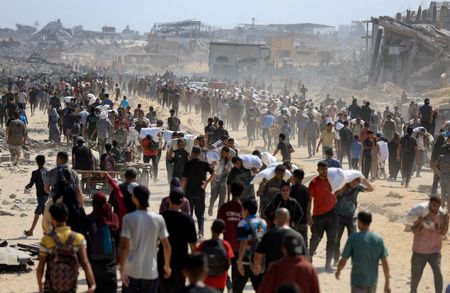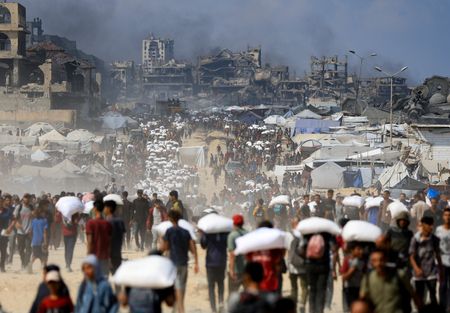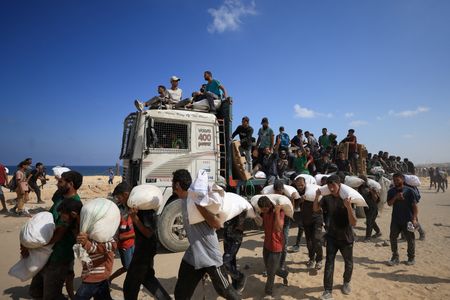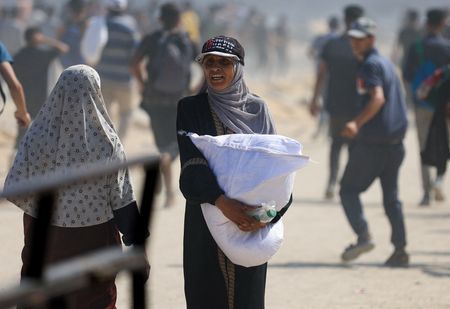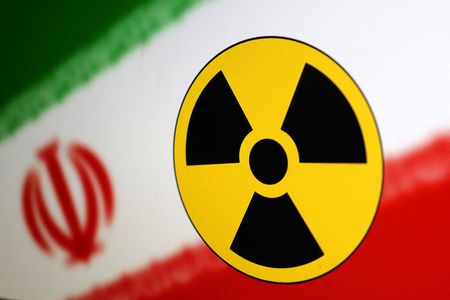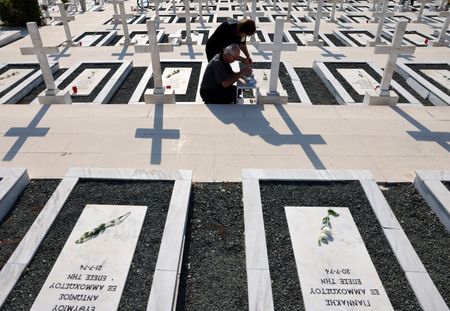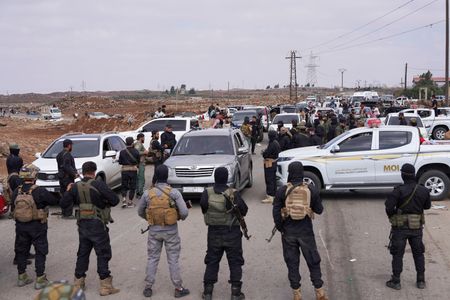By Nidal al-Mughrabi
CAIRO (Reuters) -At least 67 Palestinians were killed by Israeli fire as they waited for U.N. aid trucks in northern Gaza on Sunday, the Gaza health ministry said, as Israel issued new evacuation orders for areas packed with displaced people.
The ministry said dozens of people were also wounded in the incident in northern Gaza. It was one of the highest reported death tolls among repeated recent cases in which aid seekers have been killed, including 36 on Saturday. Another six people were killed near another aid site in the south, it said.
Israel’s military said its troops had fired warning shots towards a crowd of thousands of people in northern Gaza on Sunday to remove what it said was “an immediate threat”.
It said initial findings suggested reported casualty figures were inflated, and it “certainly does not intentionally target humanitarian aid trucks”.
It did not immediately comment on the incident in the south.
The U.N. World Food Programme (WFP) said that shortly after entering Gaza, a WFP convoy of 25 trucks carrying food aid encountered “massive crowds of hungry civilians” who then came under gunfire.
“WFP reiterates that any violence involving civilians seeking humanitarian aid is completely unacceptable,” it said in a statement.
A Hamas official told Reuters that the militant group was angered over the mounting deaths and the hunger crisis in the enclave, and that this could badly affect ceasefire talks underway in Qatar.
In total, health authorities said 90 people had been killed by Israeli gunfire and airstrikes across the enclave on Sunday.
DISPLACED GAZANS EVACUATE
After Israel’s military dropped leaflets urging people to evacuate from neighbourhoods in central Gaza’s Deir al-Balah, residents said Israeli planes struck three houses in the area.
Dozens of families began leaving their homes, carrying some of their belongings. Hundreds of thousands of displaced Gazans have been sheltering in the Deir al-Balah area.
Israel’s military said it had not entered the districts subject to the evacuation order during the current conflict and that it was continuing “to operate with great force to destroy the enemy’s capabilities and terrorist infrastructure in the area”.
Israeli sources have said the reason the army has so far stayed out is because they suspect Hamas might be holding hostages there. At least 20 of the remaining 50 hostages in captivity in Gaza are believed to still be alive.
Hostage families demanded an explanation from the army.
“Can anyone (promise) to us that this decision will not come at the cost of losing our loved ones?” the families said in a statement.
ACCELERATING STARVATION
Much of Gaza has been reduced to a wasteland during more than 21 months of war and there are fears of accelerating starvation.
Palestinian health officials said hundreds of people could soon die as hospitals were inundated with patients suffering from dizziness and exhaustion due to the scarcity of food and a collapse in aid deliveries.
“We warn that hundreds of people whose bodies have wasted away are at risk of imminent death due to hunger,” said the health ministry, which is controlled by Hamas.
The United Nations also said on Sunday that civilians were starving and needed an urgent influx of aid.
Pope Leo called for an end to the “barbarity of war” as he spoke of his profound pain over an Israeli strike on the sole Catholic church in Gaza that killed three people on Thursday.
Gaza residents said it was becoming impossible to find essential food such as flour. The health ministry said at least 71 children had died of malnutrition during the war, and 60,000 others were suffering from symptoms of malnutrition.
Later on Sunday, it said 18 people have died of hunger in the past 24 hours.
Food prices have increased well beyond what most of the population of more than two million can afford.
Several people who spoke to Reuters via chat apps said they either had one meal or no meal in the past 24 hours.
“As a father, I wake up in the early morning to look for food, for even a loaf of bread for my five children, but all in vain,” said Ziad, a nurse.
“People who didn’t die of bombs will die of hunger. We want an end to this war now, a truce, even for two months,” he told Reuters.
Others said they felt dizzy walking in the streets and that many fainted as they walked. Fathers leave tents to avoid questions by their children about what to eat.
UNRWA, the U.N. refugee agency dedicated to Palestinians, demanded Israel allow more aid trucks into Gaza, saying it had enough food for the entire population for over three months which was not allowed in.
Israel’s military said that it “views the transfer of humanitarian aid into the Gaza Strip as a matter of utmost importance, and works to enable and facilitate its entry in coordination with the international community”.
TRUCE TALKS
Some Palestinians suggested the move on Deir al-Balah might be an attempt to put pressure on Hamas to make more concessions in long-running ceasefire negotiations.
Israel and Hamas are engaged in indirect talks in Doha aimed at reaching a 60-day truce and hostage deal, although there has been no sign of breakthrough.
The war began when Hamas-led militants stormed into Israel on October 7, 2023, killing 1,200 people and taking 251 hostages back to Gaza.
The Israeli military campaign against Hamas in Gaza has since killed more than 58,000 Palestinians, according to health officials, displaced almost the entire population and plunged the enclave into a humanitarian crisis.
(Reporting by Nidal al-Mughrabi and Crispian BalmerAdditional reporting by Michelle Nichols in New York and Keith Weir;Editing by Crispian Balmer, Aidan Lewis, Helen Popper and Andrew Heavens)

